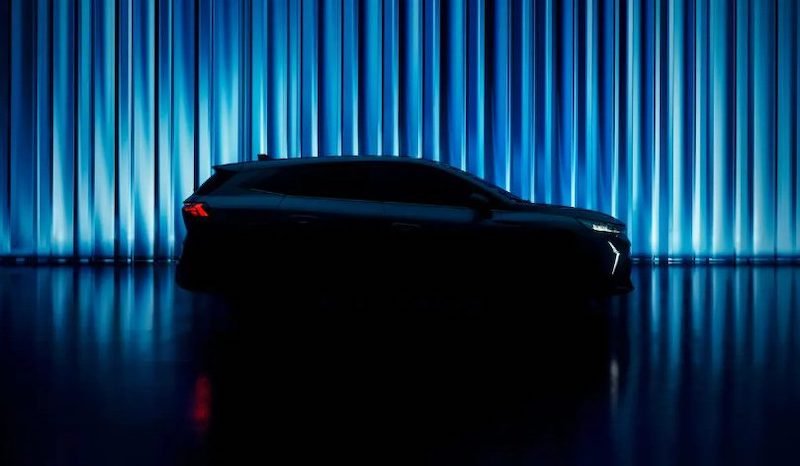New Renault Symbioz is family-focused hybrid SUV for £30k

The new Renault Symbioz completes the expansion of the brand’s line-up in the crucial SUV C-segment and is designed to evoke the spirit of the 1960s 16 saloon and the 1980s Espace by focusing on practicality.
The new hybrid will sit between the smaller Captur – alongside which it was developed – and larger Austral in the French firm’s combustion-engined car line-up, making it a direct rival to the Nissan Qashqai.
It’s purposefully practical in design terms, in contrast with Renault’s electric cars. And while the French firm has revived classic names such as the Megane, 5, 4 and Twingo for future EVs, the Symbioz name is new to the range. It has only previously been used on a 2017 electric concept that was focused on autonomous driving.
Paula Fabregat, Renault’s small car design chief, called the Symbioz as “more rational and less emotional” than the firm's new EVs, adding: “The 5 [supermini] is an amazing object; this is an amazing answer.”
She added the focus to develop a car that was "a very good answer for a lot of families" helped determine the boxy shape of the Symbioz, although she added that it was "a sexy box".
While the machine was imagined as a family car, Renault will also target fleet buyers due to its efficient hybrid powertrain, and it anticipates the business market could account for 40% of UK sales.
The Symbioz sits on the same CMF-B platform that’s used by ICE Renaults such as the Clio supermini and Arkana coupé-SUV. It was developed alongside the Captur, but is intended to fill a different market gap.
The Symbioz is 4413mm long, 1797mm wide and 1575mm high. For comparison the Captur is 4227mm long, while the larger Austral measures 4510mm. The Symbioz is broadly an equivalent to the electric Scenic, which measures 4470mm.
The shared development with the Captur can be seen from the near-identical front design, the only difference being the pattern worked into the grille. As with other new Renault models, many of the design details reflect the diagonal shape of Renault's logo.
“This was a smart project,” added Fabregat. “We had white space from the beginning, so we had space to find a recipe. We have an amazing platform and product with the Captur, so the goal was to take what people loved about that car and apply it to the larger C-segment.
"When we designed the latest Captur we wanted to keep the rear design similar to the previous generation model to help it be identifiable, but we did a lot of work at the front. So we followed that front with the Symbioz but then had freedom to develop a new answer for the rear end."
While the front is nearly identical, the designers had more freedom with the rest of the car, creating flowing side panels and a bespoke rear end that includes sculpted lights featuring a 3D ‘ice cube’ effect. Entry-level cars sit on 18in wheels; pricier ones get 19s.
The cabin features the same dashboard as the Captur, which includes a portrait-oriented 10.4in touchscreen running Renault’s Google-based OpenR Link infotainment system.
The rear seats can slide 160mm backwards, meaning they can offer up to 221mm of knee room or expand the boot capacity from 492 litres to an impressive 624 – which rises to 1582 with those 60:40-split seats folded down.
In the UK, the range-topping Iconic Esprit Alpine model will be offered with a Solarbay sunroof, which uses automatically tinting electrochromic glass in place of a blind. This is currently offered only on the electric Scenic.
The Symbioz will be offered with a total of 29 driver assistance systems, including rear automatic emergency braking and even a safety coach. As in the Scenic, a “magic button”can activate or deactivate up to six customised ADAS.
At launch, the sole powertrain option will be Renault’s E-Tech Full Hybrid 145 system, which combines a 1.6-litre four-cylinder petrol engine, a multimodal automatic gearbox, two electric motors and a 1.2kWh battery to offer up to 145bhp and official fuel economy of 61.4mpg. Renault claims that it is capable of running on electric power around 80 per cent of the time in city driving.
The system is largely identical to that in the Captur E-Tech, including an E-Save button that will maintain the battery charge. Renault highlights the comparatively light weight of the Symbioz – at just under 1500kg – as being key to its efficiency.
The Symbioz will go on sale later this year. Pricing and full UK specifications are yet to be finalised, but entry-level models are set to cost just under £30,000.
Related News
